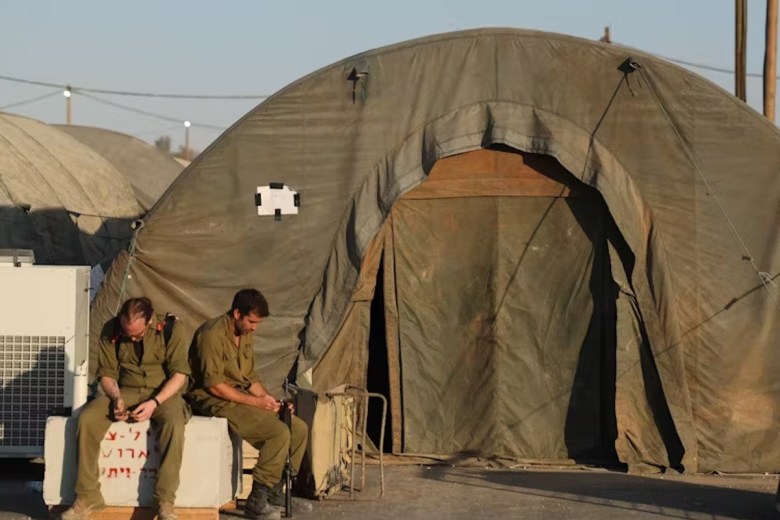Politics
Israeli Reservists Reject Orders as Conflict Intensifies in Gaza

The Israeli government is facing increasing challenges as a growing number of reservists refuse to comply with military orders amid the ongoing conflict in Gaza. Prime Minister Benjamin Netanyahu has directed the Israel Defense Forces (IDF) to intensify operations in Gaza City, despite mounting domestic and international criticism. On August 2, 2023, approximately 40,000 reservists were called up, with an additional 90,000 expected to be mobilized by the end of March 2026. However, reports indicate a significant decline in the number of soldiers willing to serve.
The IDF’s mobilization efforts follow the attacks by Hamas on October 7, 2023, which led to one of the largest military call-ups in Israel’s history. Initially, 360,000 reservists and 100,000 high-school leavers joined active duty, achieving a historic response rate of 120%. Yet, as the conflict drags on, commanders are reporting a troubling decrease in volunteerism, with estimates suggesting a decline in reserve deployment of up to 50%.
The reasons for this shift are complex. A report from the left-wing media outlet +972mag indicates that between October 2023 and April 2025, approximately 1,500 soldiers—around 1.5%—refused their orders due to ethical and ideological concerns. Many others cite fatigue and disillusionment with a war that has not produced a resolution or returned Israeli hostages taken by Hamas.
The implications of this reluctance among reservists could create significant challenges for Netanyahu’s administration. The IDF’s operational capabilities are heavily reliant on a sufficient number of soldiers, and any sustained decline in volunteerism could hinder military objectives. Public declarations of refusal, while not reaching critical levels, still carry substantial political weight and challenge the government’s approach.
Historical Context of Military Refuseniks
The phenomenon of military refusal in Israel is not new. The first notable wave occurred during the Lebanon War in 1982, when approximately 3,000 reservists signed a petition against using military force to resolve the Palestinian issue. This movement led to the formation of Yesh Gvul, advocating against service in the Occupied Territories and supporting those imprisoned for their refusals.
During the second Intifada, which began in 2000, a new wave of selective refusals emerged, as soldiers expressed their resistance based on their experiences in the field. More recently, in the summer of 2023, as protests against judicial reforms escalated, 1,000 elite Israeli combat pilots refused to serve, citing these reforms as a threat to democracy.
While societal attitudes towards refuseniks can be mixed, those who have already served are often afforded some sympathy. A recent opinion piece in the New York Times highlighted the sentiment among some refusers that “refusing to serve is not betrayal of the state. Refusing is the only way to save it.”
Political Ramifications and Future Prospects
The current wave of reservists opting not to fulfill their duties reflects a broader discontent with the Israeli government’s military strategy. As more citizens publicly oppose Netanyahu’s actions, the potential for further refusals could complicate military operations in Gaza. Despite this, Netanyahu has remained steadfast, showing little indication of altering his course in response to either domestic or international pressure.
As the situation continues to evolve, the Israeli government must navigate the delicate balance between maintaining military effectiveness and addressing the growing dissent among its citizen-soldiers. The outcome of this struggle could have lasting implications for Israel’s military strategy and its political landscape.
-

 World5 months ago
World5 months agoSouth Korea’s Foreign Minister Cho Hyun to Visit China This Week
-

 Business5 months ago
Business5 months agoStarling Bank Plans Secondary Share Sale, Targeting $5.4 Billion Valuation
-

 Top Stories5 months ago
Top Stories5 months agoMunsang College Celebrates 100 Years with Grand Ceremony
-

 World5 months ago
World5 months agoPAS Aims to Expand Parliamentary Influence in Upcoming Election
-

 Business7 months ago
Business7 months agoKenvue Dismisses CEO Thibaut Mongon as Strategic Review Advances
-

 Lifestyle6 months ago
Lifestyle6 months agoHumanism Camp Engages 250 Youths in Summer Fest 2025
-

 Sports6 months ago
Sports6 months agoDe Minaur Triumphs at Washington Open After Thrilling Comeback
-

 Sports7 months ago
Sports7 months agoTupou and Daugunu Join First Nations Squad for Lions Clash
-

 Top Stories7 months ago
Top Stories7 months agoColombian Senator Miguel Uribe Shows Signs of Recovery After Attack
-

 World7 months ago
World7 months agoASEAN Gears Up for Historic Joint Meeting of Foreign and Economic Ministers
-

 Health6 months ago
Health6 months agoNew Study Challenges Assumptions About Aging and Inflammation
-

 Business7 months ago
Business7 months agoOil Prices Surge Following New EU Sanctions on Russia









